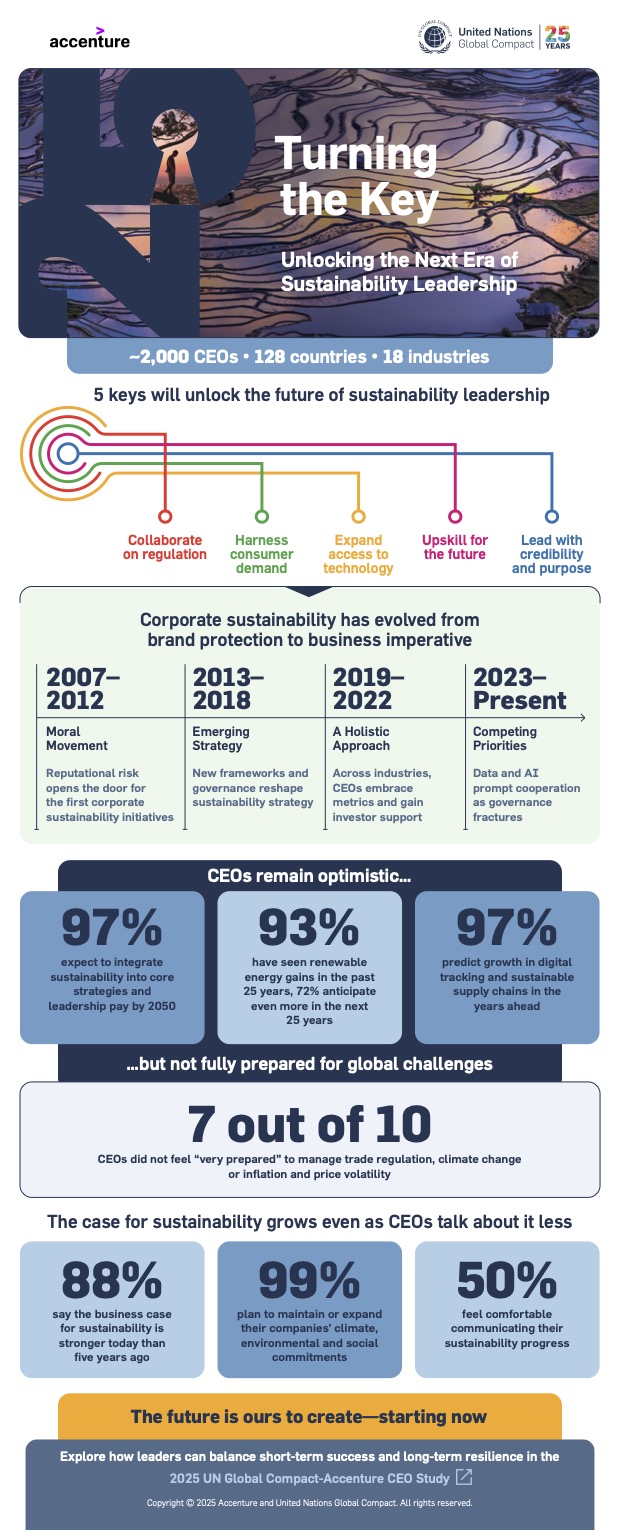2025 UN Global Compact–Accenture CEO Study: Turning the Key
Read more

Leading the next era of sustainability
The CEO Study, co-authored by the UN Global Compact and Accenture, provides readers with a window into the trending topics of effective business from leaders around the world. Since its initial publication in 2007, thousands of CEOs have shared their perspectives, charting how sustainability has moved from a reputational risk to a central business strategy.
The CEO Study is a roadmap tracing how sustainability evolved into a central pillar of corporate strategy. The 2025 edition earned the metaphor Turning the Key, emphasizing how sustainability has entered a new era of pragmatism.
In 2025, participating CEOs reported that they are balancing ambition with constraints such as uneven access to capital, fractured governance and widespread geopolitical uncertainty. Many are still pressing forward, but often with more caution about how openly they communicate their efforts.
The 2025 CEO Study reveals:
- 88 per cent of CEOs say the business case for sustainability is stronger than five years ago
- 99 per cent of CEOs plan to maintain or expand their ESG commitments
- Yet, only half of CEOs are comfortable speaking publicly about their progress

While commitments to the Sustainable Development Goals (SDGs) have fallen short of expectations to date, the CEO Study emphasizes that corporations remain committed to continued sustainability efforts and progress is within reach. CEOs stress that we can accelerate action despite setbacks, demonstrating a shift from aspirational promises to practical, results-driven strategies.

Keys for the next era of leadership
The study identifies five keys to unlock the next era of sustainable leadership:
- Collaborate on regulation
CEOs recognize that regulation is not just a compliance exercise but a chance to create clarity and consistency. By working together to align environmental, social and governance (ESG) policies and harmonize best practices, businesses can reduce fragmentation and build a level playing field that rewards real progress. Collaboration remains central to how we can mobilize the sustainability sector. - Harness consumer demand
Businesses have learned that they can unlock new markets and create shared value by meeting consumers “where they are”. Consumers continuously inform both the public and private sectors, and act as influential stakeholders and drivers of sustainability decisions. - Expand access to technology
Technology is a powerful accelerator of sustainability, but access remains uneven. CEOs emphasized that equitable access to digital tools, reliable data and innovative solutions is critical if the benefits are to be realized across industries and regions. Broadening this access can empower more organizations to meet their goals and help close the global sustainability gap. - Upskill for the future
With the growing role of technology and AI, the future of sustainable business depends on the combination of people and technology. Many CEOs have highlighted the importance of building a workforce fluent in both sustainability strategy and digital skills. Equipping employees at every level with the knowledge and tools they need not only strengthens resilience but also drives organizational innovation - Lead with credibility and purpose
Trust is non-negotiable in setting reputable standards. CEOs told us that authentic communication and linking sustainability directly to business fundamentals are critical to maintaining credibility. Leading with transparency fosters confidence among stakeholders, ensuring commitments translate into lasting impact.
CEOs of the future
From leveraging collaboration to advancing technology, the tools for action are ready. Now, the question is what we do with them.
Learn more from the 1,900 CEOs across 128 countries, examining how leaders are moving from ambition to action in the United Nations Global Compact–Accenture 2025 CEO Study.
The inclusion of company names and/or examples is intended strictly for learning purposes and does not constitute an endorsement of the individual companies by the UN Global Compact.


